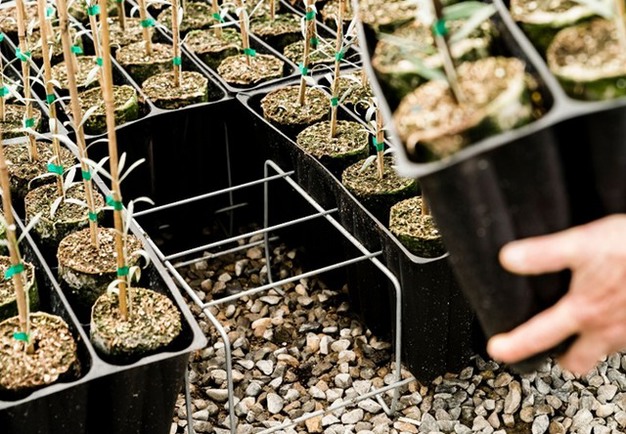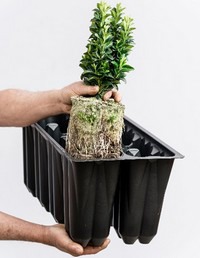While the horticultural industry has long used plastics for trays and pots, the consumer push towards environmental sustainability has some companies rethinking their business models to reduce their carbon footprint. Ahead of their time, Blackmore Company, a commercial horticultural systems and equipment supplier based in Michigan, embarked on recycling and reusing its plastic over a decade ago. Established in 1966, this family-owned and operated company has consistently sought to devise and implement smart, simple solutions for their customers.
When tackling the challenge of recycling plastic, Scott Blackmore, third generation owner, knew he needed to create a channel for customers to recycle their trays, however, to make it financially sustainable, he also needed to devise a way to reuse that plastic and reduce the amount of virgin plastic they used. He was successful. Today Blackmore recycles used trays from participating customers and reuses them in their manufacturing processes. Combining this post-consumer plastic with post-industrial plastics, their trays are now composed of up to 90% recycled plastics.
“More work on recycling and reusing plastics is still needed to make it a viable option for customers no matter where they are located,” says Lars Jensen, National Sales Director for Blackmore Company. “While some companies, our competitors included, are also making strides here, in order to maximize accessibility and minimize additional carbon costs in the recovery process, everyone needs to be involved.”
Lars acknowledges recycling and reusing plastics is only part of the path to net zero and their next step at Blackmore is to focus on reducing the total amount of plastic put into the system. Interested in developing a comprehensive solution for this, they are working with Dr. Kate Santos, a botanical expert and consultant in the horticulture industry. “What excites me about working with the Blackmore team is the opportunity to be part of an important evolution for their company and our industry,” explains Kate. “Blackmore has chosen to take a holistic approach to the plastic challenge by improving upon the circularity of the system and its products. The strides they made over 10 years ago have positioned them well for where to go next.”
What does Blackmore want to focus on next? A more circular alternative to the plastic pot. A study conducted in 2019 found only 9% of plastic waste produced was recycled. Kate emphasizes that the recycling infrastructure today cannot adequately handle both the volume and diversity of products that consumers try to recycle, therefore the majority is still ending up in landfills. “The biggest impact we can have as an industry is to reduce the amount of plastic we put in the system to begin with,” says Kate.
Blackmore is proposing an integrated solution called Air Tray® Technologies that reduces the amount of plastic in the wholesale production system, increases the circularity of their products by keeping them within the wholesale stream, brings manufacturing local, and optimizes production efficiencies for growers. Air Tray® Technologies combines Blackmore’s recent Air Tray® advancements with innovations like the Ellepot to provide a plantable alternative to the plastic pot. Blackmore plans to offer a complimentary retail packaging solution that reduces the amount of plastic going to retail by 95%. Look for the first prototypes at Cultivate this summer.
 Air Tray® Racks elevate plants to increase air flow to the roots, minimize risk of disease transmission, and improve transport efficiencies.
Air Tray® Racks elevate plants to increase air flow to the roots, minimize risk of disease transmission, and improve transport efficiencies.

Air Tray® by Blackmore Company with a boxwood rooted in a 100mm Ellepot. The well branched roots are a result of the air root pruning achieved through the patented tray design.
Environmentally sustainable
“We invite the industry to come and see what we are working on. Our strategy to reduce plastic waste is more than an environmentally sustainable one, but also financially sustainable. By reducing waste, you can also reduce costs,” says Lars, “Ask us how.”
Does Blackmore see plastics staying in the wholesale stream forever? Not necessarily. There are several developments they are watching in biopolymers that could be the material of the future. But before they make that leap, it will be about understanding the full life cycle of the material and the infrastructure available to support processing it. For now, Blackmore will continue to do what they do best. "Focus on developing smart, simple and sustainable solutions for our customers and the industry."
For more information:
Blackmore Company
info@blackmoreco.com
www.blackmoreco.com
